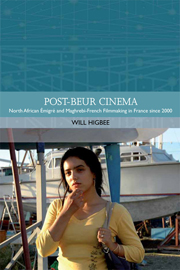Book contents
- Frontmatter
- Contents
- Acknowledgements
- List of Illustrations
- Traditions in World Cinema
- 1 Introduction: From Immigrant Cinema to National Cinema
- 2 The (Maghrebi-)French Connection: Diaspora goes Mainstream
- 3 Colonial Fracture and the Counter-Heritage Film
- 4 Of Spaces and Difference in the Films of Abdellatif Kechiche
- 5 Home, Displacement and the Myth of Return: Journey Narratives in the 2000s
- 6 Screening Islam: cinematic Representations of the Muslim Community in France in the 2000s
- 7 Conclusion: Post-Beur Cinema
- Bibliography
- Index
4 - Of Spaces and Difference in the Films of Abdellatif Kechiche
Published online by Cambridge University Press: 05 October 2013
- Frontmatter
- Contents
- Acknowledgements
- List of Illustrations
- Traditions in World Cinema
- 1 Introduction: From Immigrant Cinema to National Cinema
- 2 The (Maghrebi-)French Connection: Diaspora goes Mainstream
- 3 Colonial Fracture and the Counter-Heritage Film
- 4 Of Spaces and Difference in the Films of Abdellatif Kechiche
- 5 Home, Displacement and the Myth of Return: Journey Narratives in the 2000s
- 6 Screening Islam: cinematic Representations of the Muslim Community in France in the 2000s
- 7 Conclusion: Post-Beur Cinema
- Bibliography
- Index
Summary
In previous chapters of this book, it has been argued that Maghrebi-French and North African émigré filmmaking has undergone a transformation in the 2000s that brought certain filmmakers firmly into the mainstream. In the case of actor, writer and director Abdellatif Kechiche, a different (but no less significant) kind of evolution has taken place.
Kechiche was born in Tunisia and arrived in France at the age of six. He grew up on a working-class estate on the outskirts of Nice, not far from the city's famous Victorine studios. During his youth, he indulged a passion for cinema through regular trips to the Nice cinématèque, where he first discovered many of the great French actors – Michel Simon, Jules Berry, Harry Baur, Arletty – and later directors such as De Sica, Pasoloini, Pialat and Sautet (Kechiche in Morice 2007). After studying acting at the Conservatoire de Nice he embarked on a career in the theatre that led to a limited number of film roles, most notably as the lead in Le Thé à la menthe (Bahloul, 1984) and Bezness (Bouzid, 1992).
Reacting against what he saw as the paucity of meaningful roles for Maghrebi-French actors, beyond stereotypical portrayals as immigrants, delinquents or criminals, Kechiche began to develop his own screenplays in the 1990s (Kechiche in Morice 2007).
- Type
- Chapter
- Information
- Post-beur CinemaNorth African Émigré and Maghrebi-French Filmmaking in France since 2000, pp. 96 - 129Publisher: Edinburgh University PressPrint publication year: 2013



